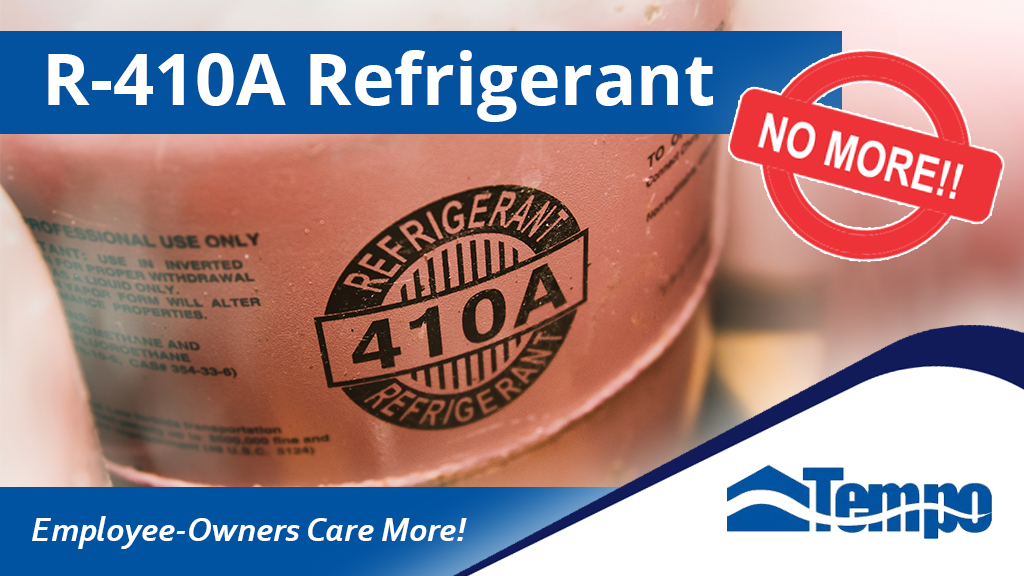The HVAC industry is always evolving — and it looks like a new change is on the horizon. In December 2020, the United States government passed the American Innovation and Manufacturing (AIM) Act. This AIM Act tasks the Environmental Protection Agency (EPA) with phasing out the production and consumption of HFCs.
HFCs, which include R-410A refrigerant, are greenhouse gases that can have various uses. Since the AIM Act was passed, it’s safe to say that R410A refrigerant is being phased out — slowly but surely.
So, what does this R410A refrigerant phase-out mean for you? Let’s carefully go over everything you need to know below.
Understanding the R-22 Refrigerant Phase Out
Before we can discuss why R-410A refrigerant is being phased out, it’s important to know about the phase-out of R-22 refrigerant starting in 2010.
On January 1, 2010, the EPA banned the production of HVAC systems running on R-22 refrigerants. R-22, an HCFC refrigerant, is believed to negatively affect the Earth’s ozone layer and contribute to global warming.
The height of this ban came on January 1, 2020, when the import and production of R-22 refrigerant were eliminated completely. Now, R-22 can only be recycled, reclaimed, or purchased from whatever supplies are left.
R-410A refrigerant was designated as a suitable alternative to R-22. However — this has changed now that the AIM Act is here and an R410A refrigerant phase-out sits on the horizon.
Reasons for the R-410A Phase Out
Although R-410A was initially considered to be better for the environment than R-22, feelings toward this sentiment have changed. It’s believed that R-410A and other HFCs have high global warming potential (GWP). This means that they are not as environmentally friendly as previously thought.
It’s worth pointing out that different HFCs will have different global warming potentials. HFCs can have many applications — including aerosols. However, since all HFCs are included in the AIM Act, it stands to reason that R-410A refrigerants will be greatly affected during the phase-out of these substances.
Although R410A refrigerant is being phased out, this isn’t the only change being made to air conditioning systems and their equipment. If you’re planning on upgrading your HVAC system soon, it’s important to know what these changes are and how they can potentially affect you.
Additional AC Equipment Changes Coming in 2023
Starting on January 1, 2023, the energy efficiency standards for HVAC equipment will increase. These regulatory requirements will affect central air conditioning systems and heat pumps alike. However, it’s crucial to note that the regulations will vary depending on where you live.
Overall, you can expect the minimum SEER rating on HVAC equipment to increase immediately starting in the new year. Although higher efficiency ratings can help you save money on your energy bills, the equipment itself will increase in cost.
What Refrigerant Will Replace R-410A?
As you can probably imagine, R-410A is likely to be replaced with lower-GWP refrigerants. The alternative types of refrigerants will include R-32 and R-454B. These options are placed under an umbrella known as A2L refrigerants; they’re mildly flammable but have little to zero ozone depletion.
When the R410A refrigerant phase-out occurs, there’s a good chance that you’ll hear these refrigerants mentioned everywhere. There will most likely need to be new procedures put in place for professionals handling these mildly flammable refrigerants as well.
How Often Does a Central AC Unit Need Refrigerant?
Now that you know more about why R410A refrigerant is being phased out, you might be feeling overwhelmed. Fortunately, there’s really no reason for you to worry. The refrigerant in air AC units typically doesn’t need to be replaced since the same refrigerant can be used again and again. In most cases, the only time you’ll need to replace refrigerant is when there is a leak in your unit.
If you think you have a refrigerant leak on your hands, it’s best to schedule an air conditioning repair in Frisco, TX, as soon as possible. The sooner you address the problem, the better.
Contact Tempo Air for Your Cooling Needs!
Although R410A refrigerant is being phased out, there’s little chance that this particular problem will affect you for many years to come. Still, if your air conditioner is more than 15 years old and has issues with performance, don’t hesitate to schedule a replacement with Tempo Air.
We are proud to offer highly-efficient air conditioners that can meet your comfort needs. Get in touch with us today for an AC service in Frisco, TX, and the surrounding areas!


